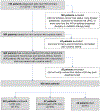Characterizing head and neck cancer survivors' discontinuation of survivorship care
- PMID: 34460935
- PMCID: PMC8678194
- DOI: 10.1002/cncr.33888
Characterizing head and neck cancer survivors' discontinuation of survivorship care
Abstract
Background: Little is known about cancer survivors who discontinue survivorship care. The objective of this study was to characterize patients with head and neck cancer who discontinue survivorship care with their treating institution and identify factors associated with discontinuation.
Methods: This was a retrospective cohort study of patients diagnosed with head and neck cancer between January 1, 2014, and December 31, 2016, who received cancer-directed therapy at the University of Iowa Hospitals and Clinics (UIHC). Eligible patients achieved a cancer-free status after curative-intent treatment and made at least 1 visit 90+ days after treatment completion. The primary outcome was discontinuation of survivorship care, which was defined as a still living survivor who had not returned to a UIHC cancer clinic for twice the expected interval. Demographic and oncologic factors were examined to identify associations with discontinuation.
Results: Ninety-seven of the 426 eligible patients (22.8%) discontinued survivorship care at UIHC during the study period. The mean time in follow-up for those who discontinued treatment was 15.4 months. Factors associated with discontinuation of care included an unmarried status (P = .036), a longer driving distance to the facility (P = .0031), and a single-modality cancer treatment (P < .0001). Rurality was not associated with discontinuation (24.3% vs 21.6% for urban residence; P = .52), nor was age, gender, or payor status.
Conclusions: The study results indicate that a sizeable percentage of head and neck cancer survivors discontinue care with their treating institution. Both demographic and oncologic factors were associated with discontinuation at the treating institution, and this points to potential clinical and care delivery interventions.
Keywords: cancer survivors; follow-up; head and neck cancer; retention in care; survivorship.
© 2021 American Cancer Society.
Conflict of interest statement
Figures
References
-
- Ragin CCR, Taioli E. Survival of squamous cell carcinoma of the head and neck in relation to human papillomavirus infection: review and meta-analysis. Int J cancer. 2007;121(8):1813–1820. - PubMed
Publication types
MeSH terms
Grants and funding
LinkOut - more resources
Full Text Sources
Medical




